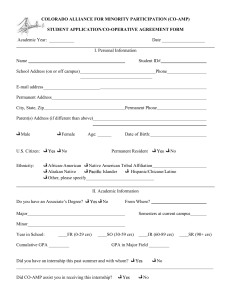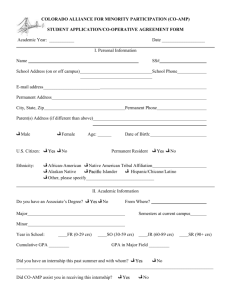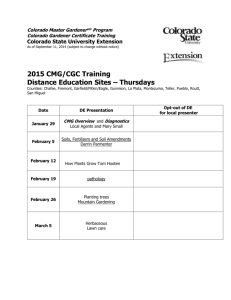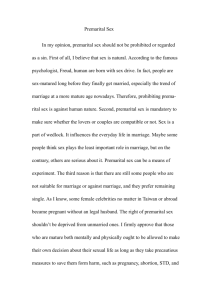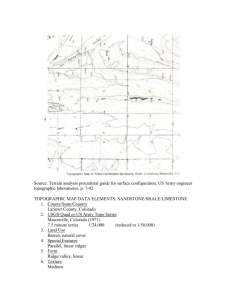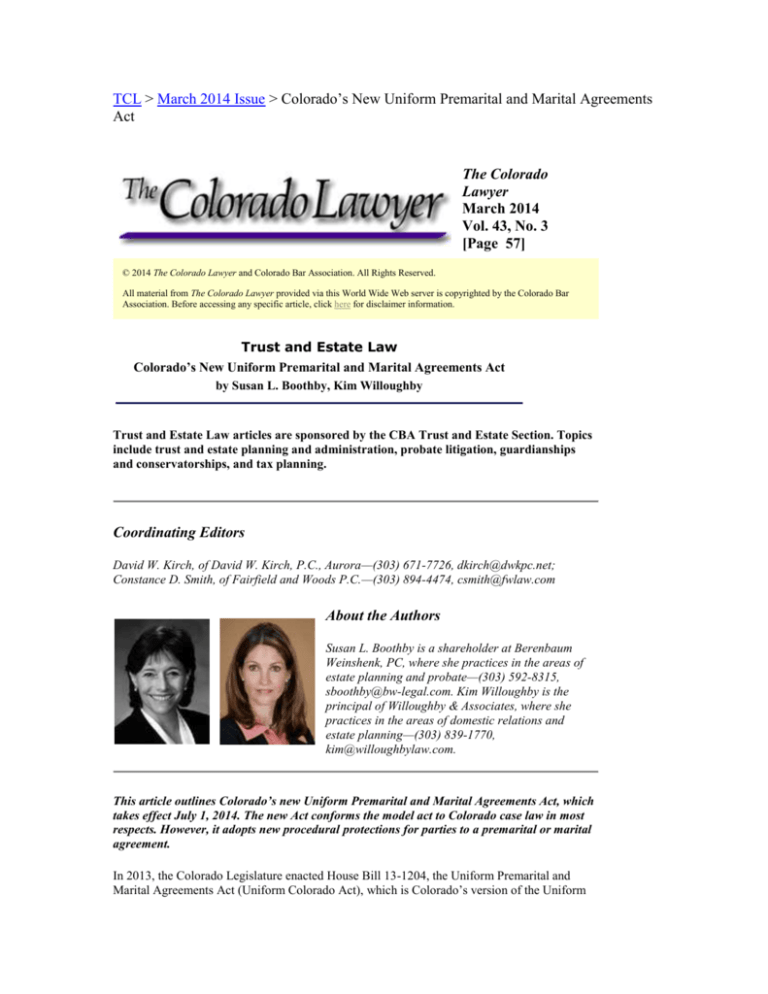
TCL > March 2014 Issue > Colorado’s New Uniform Premarital and Marital Agreements
Act
The Colorado
Lawyer
March 2014
Vol. 43, No. 3
[Page 57]
© 2014 The Colorado Lawyer and Colorado Bar Association. All Rights Reserved.
All material from The Colorado Lawyer provided via this World Wide Web server is copyrighted by the Colorado Bar
Association. Before accessing any specific article, click here for disclaimer information.
Trust and Estate Law
Colorado’s New Uniform Premarital and Marital Agreements Act
by Susan L. Boothby, Kim Willoughby
Trust and Estate Law articles are sponsored by the CBA Trust and Estate Section. Topics
include trust and estate planning and administration, probate litigation, guardianships
and conservatorships, and tax planning.
Coordinating Editors
David W. Kirch, of David W. Kirch, P.C., Aurora—(303) 671-7726, dkirch@dwkpc.net;
Constance D. Smith, of Fairfield and Woods P.C.—(303) 894-4474, csmith@fwlaw.com
About the Authors
Susan L. Boothby is a shareholder at Berenbaum
Weinshenk, PC, where she practices in the areas of
estate planning and probate—(303) 592-8315,
sboothby@bw-legal.com. Kim Willoughby is the
principal of Willoughby & Associates, where she
practices in the areas of domestic relations and
estate planning—(303) 839-1770,
kim@willoughbylaw.com.
This article outlines Colorado’s new Uniform Premarital and Marital Agreements Act, which
takes effect July 1, 2014. The new Act conforms the model act to Colorado case law in most
respects. However, it adopts new procedural protections for parties to a premarital or marital
agreement.
In 2013, the Colorado Legislature enacted House Bill 13-1204, the Uniform Premarital and
Marital Agreements Act (Uniform Colorado Act), which is Colorado’s version of the Uniform
Premarital and Marital Agreements Act promoted by the National Conference of
Commissioners on Uniform State Laws.1 The new Uniform Colorado Act repeals and reenacts
with amendments the Colorado Marital Agreement Act, CRS §§ 14-2-301 et seq. It takes effect
July 1, 2014. Also effective July 1, 2014, a waiver of a marital right or obligation on the death
of a spouse is unenforceable unless the waiver is contained in a premarital or marital agreement
that is enforceable under the Uniform Colorado Act.2
Before discussing how the new Uniform Colorado Act will impact the enforcement of new and
existing premarital and marital agreements, a short review of the development of Colorado
statutes relating to premarital and marital agreements is critical. As a result of evolving
standards, the date the premarital or marital agreement was signed may determine whether
certain defenses can be raised to challenge its enforceability.
Three Standards for Enforceability
of Premarital and Marital Agreements
Colorado now has three standards for the enforceability of premarital and marital agreements,
each applied depending on when the agreement was entered into. The strictest standard is the
standard created by the new Uniform Colorado Act. However, Colorado’s version of the
Uniform Premarital and Marital Agreements Act is not as stringent as the act that was drafted by
the National Conference of Commissioners on Uniform State Laws.
Agreements Entered Into Before July 1, 1986
In the context of divorce, before 1986, there were no Colorado statutes regarding premarital or
marital agreements. The Colorado Supreme Court first upheld the enforcement of a premarital
agreement in divorce proceedings in In re Marriage of Franks.3
Four years later, in In re Marriage of Ingels,4 the Colorado Court of Appeals considered a
challenge to the validity of a premarital agreement on the grounds, inter alia, that the premarital
agreement was unconscionable at the time of signing. The court of appeals directly addressed
the issue of unconscionability, inferring but not holding that such ground for invalidating a
premarital agreement is cognizable.5 However, it determined that under the facts of Ingels, the
agreement was not unconscionable. In holding that the parties would be "held to their bargain,"
the court pointed out that the terms of the agreement were not "so unfair," financial disclosures
were made to the wife, the wife was a skilled businesswoman with a masters degree in
marketing, and she voluntarily signed the agreement.6 Although the court alluded to the fact the
wife was not represented by an attorney, that was considered as merely one of several factors
indicating that the agreement was entered into knowledgably.7
Also in 1979, in In the Marriage of Stokes, the court of appeals held that a valid premarital
agreement, unlike a separation agreement, could not be successfully challenged as
unconscionable at the time of divorce.8 The decision of Stokes was followed a year later by the
Colorado Court of Appeals decision in Estate of Lebsock,9 where the court held that premarital
agreements may be deemed unenforceable as to property issues if the agreement was determined
to be unconscionable at the time of termination of the marriage by death. 10
The Colorado Supreme Court considered Stokes and Lebsock to be in conflict with one another
"regarding the application of an unconscionability test to antenuptial agreements." 11 The
Colorado Supreme Court resolved the conflict in Newman v. Newman,12 holding that property
provisions of a premarital agreement are not subject to review for unconscionability at the time
of divorce. Rather, parties seeking to invalidate a premarital agreement can do so only if they
can demonstrate nondisclosure, fraud, or overreaching at the time the agreement was made.13
However, maintenance provisions of the same agreement may become "voidable for
unconscionability occasioned by circumstances existing at the time of the marriage
dissolution."14 Newman held this was so even if the premarital agreement "is entered into in
good faith, with full disclosure and without any element of fraud or overreaching." 15
Agreements Entered Into on or
After July 1, 1986 and Before July 1, 2014
In 1983, the National Conference of Commissioners on Uniform State Laws adopted the
Uniform Premarital Agreement Act (UPAA 1). As a response to the possible enactment of
UPAA 1 in Colorado, the Colorado Legislature enacted the Colorado Marital Agreement Act,
effective for agreements entered into on and after July 1, 1986.
In its review of the legislative history of the Colorado Marital Agreement Act, the Colorado
Supreme Court stated that the 1986 Act "was to codify in a single statute Colorado’s thenexisting case law and statutes in order to prevent the adoption of the Uniform Premarital
Agreement Act in Colorado."16 The Colorado Marital Agreement Act followed Newman by
codifying the holding that a court may review maintenance terms of a premarital or marital
agreement for conscionability at the time of enforcement, but may not review other terms of the
agreement if the agreement was signed voluntarily and with reasonable disclosure. 17
Among other differences between UPAA 1 and the Colorado Marital Agreement Act, the
Colorado Marital Agreement Act allowed enforcement of post-marital agreements in addition to
premarital agreements, codifying the Colorado case law that an agreement entered into after
marriage will be upheld unless fraud, concealment, or failure to disclose material information
can be established.18 Later case law distinguished agreements entered into during marriage
while a divorce is being contemplated, and held that these agreements must also pass the test of
conscionability.19 These agreements are held to the standard of separation agreements.20 As
separation agreements, they may include provisions regarding children and, if otherwise
enforceable, child-related agreements will be enforceable.21
The Colorado Marital Agreement Act codified several requirements for an enforceable
premarital or marital agreement:
1) a premarital or marital agreement must be in writing and signed by both parties (CRS
§§ 14-2-302(1) and -303));
2) a premarital or marital agreement must be entered into voluntarily (CRS § 14-2307(1)(a));
3) each party must provide to the other a fair and reasonable disclosure of his or her
property or financial liabilities before executing the agreement (CRS § 14-2307(1)(b));22
4) a premarital or marital agreement may not violate public policy (CRS § 14-2304(1)(i));23 and
5) a premarital or marital agreement may not adversely affect the right of a child to child
support (CRS § 14-2-304(3)).
Agreements Entered Into on or After July 1, 2014
In 2010, the National Conference of Commissioners on Uniform State Laws appointed a
committee to draft a new uniform act to set forth standards for determining the enforceability of
premarital and marital agreements. This resulted in the adoption of the Uniform Premarital and
Marital Agreements Act (UPAA 2) in 2012.24 Colorado and North Dakota are the only states
that have adopted UPAA 2 at this time.25
Major differences between UPAA 1 and UPAA 2 are found in the enforcement sections. UPAA
2 provides additional "due process in formation, on one hand, and certain minimal standards of
substantive fairness, on the other."26 As will be explained later in this article, the Colorado
Legislature adopted all of the due process protections of UPAA 2.
Importantly, however, the Colorado Legislature did not adopt any new substantive fairness
standards found in UPAA 2. Thus:
> UPAA 2 had an alternative provision to allow an inquiry into whether the premarital or
marital agreement was unconscionable at the time of signing or whether enforcement of
a term would result in serious hardship for a party because of a material change in
circumstances arising after the agreement was signed.27 This alternative was not adopted
by the Colorado Legislature.
> UPAA 2 requires spousal support "to the extent necessary to avoid eligibility for
programs of public assistance." 28 The Uniform Colorado Act allows an inquiry of
whether a waiver or agreement about spousal support would be unconscionable. 29 The
Colorado Act does not set the bar at eligibility for public support, but instead
incorporates the language of the Colorado Marital Agreement Act.30 In this regard, the
Uniform Colorado Act did not change the Colorado Marital Agreement Act provision
regarding spousal support.
> The Colorado Legislature modified the Uniform Colorado Act to include Colorado
common law rules not found in UPAA 2.
> The Uniform Colorado Act codified the Colorado Supreme Court’s position in In re
Marriage of Ikeler,31 which held that a waiver of attorney fees in a marital agreement
can be reviewed at the time of enforcement if it is unconscionable. 32
> Finally, although this issue is not specifically addressed in Colorado case law, the
Colorado Legislature did not enact the provision of UPAA 2 addressing waiver of
financial disclosure.33 This will be explained in detail below.
Requirements of Uniform Colorado Act for an
Enforceable Premarital or Marital Agreement
The Uniform Colorado Act creates new requirements for premarital and marital agreements to
be deemed enforceable. Additionally, the Uniform Colorado Act expanded the list of
unenforceable terms.
Access to Counsel and
Other Procedural Requirements
UPAA 1 was criticized for going "too far in the direction of contractual autonomy at the
expense of other manifest public policies relevant to marriage and divorce." 34 To a certain
extent, the additional due process requirements of a premarital or marital agreement under
UPAA 2 have already been used in one form or another in the best practices of Colorado estate
planning and domestic relations attorneys who want to ensure that the premarital or marital
agreements they draft will not be challenged.35 Although UPAA 2 did not go so far as to require
both parties to be represented by counsel36 or mandating any particular "cooling off" period,
both UPAA 2 and the Uniform Colorado Act require that the party against whom enforcement is
sought had meaningful access to independent legal representation. 37
Under UPAA 2 and the Uniform Colorado Act, before signing a premarital or marital agreement
the unrepresented party must have had reasonable time to: (1) decide whether to retain a lawyer
to provide independent legal counsel; and (2) locate a lawyer, obtain a lawyer’s advice, and
consider the advice provided.38 Although Colorado has no current case law regarding the
enforceability of agreements signed on the eve of the wedding, this new requirement will make
such agreements unenforceable. If only one party is represented by a lawyer, the unrepresented
party must either: (1) have the financial ability to retain a lawyer; or (2) the represented party
must agree to pay the reasonable fees and expenses of independent legal representation for the
unrepresented party.39
UPAA 2 and the Uniform Colorado Act also attempt to ensure that unrepresented parties
waiving their rights understand the legal significance of the agreement they are entering. Unless
the party had independent legal representation at the time of signing, a notice of waiver of rights
must include language, conspicuously displayed, substantially similar to the following:
If you sign this agreement, you may be:
Giving up your right to be supported by the person you are marrying or to whom
you are married.
Agreeing to pay bills and debts of the person you are marrying or to whom you
are married.
Giving up your right to money and property if your marriage ends or the person
to whom you are married dies.
Giving up your right to have your legal fees paid. 40
As a practical tip, for agreements executed on or after July 1, 2014, lawyers need to revise their
standard language when representing a party whose spouse or fiancé is unrepresented to include
the above safe-harbor language. Failure to do so will invalidate the agreement. In addition, the
recitals of the premarital or marital agreement may include recitations that the unrepresented
party had reasonable time to decide to retain independent counsel, to locate a lawyer, and to
obtain and consider that lawyer’s advice. Further, language should be included stating that the
unrepresented party had the financial ability to retain a lawyer, or that the represented party
agreed to pay the reasonable fees and expenses of the lawyer.
Other Requirements
The other requirements of an enforceable premarital or marital agreement under the Uniform
Colorado Act are similar to the Colorado Marital Agreement Act:
> A premarital or marital agreement (or amendments thereto) must be in writing and
signed by both parties. A premarital or marital agreement is unenforceable if not "in a
record and signed by both parties." 41
> Consent to the premarital or marital agreement must be voluntary and not the result of
duress.42
> The party against whom enforcement is sought has to provide adequate financial
disclosure. Adequate financial disclosure is more fully described in the new Uniform
Colorado Act than in the Colorado Marital Agreement Act, and adds the requirement of
disclosure of income. Under new CRS § 14-2-309 (4), if the party receives a reasonably
accurate description and good-faith estimate of value of the property, liabilities, and
income of the other party, or the party has adequate knowledge or a reasonable basis to
have adequate knowledge of the property, liabilities, and income of the other party, the
party has adequate financial disclosure.43 The new financial disclosure provisions of the
Uniform Colorado Act generally reflect established Colorado case law. 44
> Notably, Section 9(d)(2) of the UPAA 2 concerning waiver of disclosure was not
included in the Uniform Colorado Act.45 Therefore, adequate disclosure remains a
requirement for a valid agreement.
Expanded List of Unenforceable Terms
Under the Uniform Colorado Act
Even if the above requirements have been met, provisions in an agreement or modification
relating to spousal maintenance or attorney fees will be unenforceable if considered
unconscionable at the time of enforcement.46 Additionally, Colorado adopted the UPAA 2’s
expanded unenforceable term section. An unenforceable term is a term that: (1) adversely
affects a child’s right to support; (2) limits or restricts a remedy available to a victim of
domestic violence; (3) attempts to modify a court-decreed legal separation or marital
dissolution; (4) penalizes a party for initiating a legal proceeding leading to legal separation or
marital dissolution; (5) violates public policy; or (6) defines rights or duties of parties regarding
custodial responsibility.47
Waiver of Rights Upon Death
Premarital and marital agreements can address the rights of a surviving spouse in the estate of a
deceased spouse. CRS § 15-11-207 has been amended so that a waiver of rights of a surviving
spouse under that statute cannot be unilateral. Although a unilateral waiver under former CRS §
15-11-207 was required to have been enforceable under the Colorado Marital Agreement Act
(voluntarily signed, without duress, and with adequate disclosure), there was no requirement
that there be an agreement between the parties. Thus, waiver documentation signed by one party
that results in the loss of a statutory right upon death is no longer sufficient. Waivers of rights
upon death will be valid only if found in a premarital or marital agreement specifically
identifying the rights waived. The repeal and reenactment of CRS § 15-11-207 is effective for
agreements entered into on or after July 1, 2014.
A reference to "a waiver of rights upon death" as provided in former CRS § 15-11-207
incorporated by reference those rights enumerated in CRS § 15-11-207(1)(a) through (c) (rights
of election of a surviving spouse, rights of the surviving spouse to exempt property, family
allowance, and the deceased spouse’s homestead exemption). As of July 1, 2014, CRS § 15-11207 does not refer to a particular list of rights that may be waived at death, and therefore
incorporation by reference to this statute will no longer be available for agreements executed on
or after July 1, 2014. Similarly, former CRS § 14-2-304(2) of the Colorado Marital Agreement
Act provided that a reference to "a waiver of all rights upon death" would incorporate by
reference all of the rights enumerated in CRS § 14-2-304(2)(a) through (c).48 The Uniform
Colorado Act does not provide a specific section that allows incorporation by reference. As a
practical tip, for agreements executed after July 1, 2014, lawyers may want to revise their
standard language for waiver of rights upon death to separately state each right the parties are
relinquishing.
Other Provisions
The Uniform Colorado Act makes clear that a premarital or marital agreement is only one that is
between persons who intend to marry or are married and relates to marital rights or obligations
during a marriage or at its termination by dissolution or death. 49 Thus, other contractual
agreements between married persons will not be confused for a premarital or marital agreement.
The Uniform Colorado Act allows for electronic signatures.50 An electronic signature for the
purposes of the Uniform Colorado Act is the attachment or association of an electronic symbol,
sound, or process to the record. The record can be an electronic record stored in a retrievable
form.51
The Uniform Colorado Act does not apply to any premarital or marital agreements signed
before July 1, 2014, and does not affect any agreements signed before July 1, 2014. 52 Therefore,
there is no need for parties to reaffirm or amend their current agreements. However,
modifications or amendments to those agreements may need to conform to the new law. 53
The Uniform Colorado Act allows for limited choice of law. Parties may choose a state’s law
other than Colorado’s to govern an agreement if that state has a significant relationship to one of
the parties or to the agreement itself, that state’s laws regarding enforcement are not contrary to
Colorado’s, and the chosen state’s laws are not contrary to Colorado’s fundamental public
policy.54
The Uniform Colorado Act specifically applies to parties to a civil union or prospective parties
to a civil union.55
Conclusion
For the first time, Colorado has enacted a uniform act to govern premarital and marital
agreements. However, Colorado remained faithful to its own common law by rejecting the parts
of the UPAA 2 that did not comport with existing law. Therefore, the Uniform Colorado Act is
not to be read as abrogating Colorado’s case law regarding premarital and marital agreements.
In enacting the Uniform Colorado Act, Colorado accepted some additional measures to ensure
that both parties are protected. The most significant change is the requirement for actual access
to an attorney for both parties, and the requirement of a clear warning on any agreement where a
party proceeds without an attorney. However, parties remain fully able to contract in any way
they wish with respect to property. Limitations remain on contracts regarding maintenance and
attorney fees. The Uniform Colorado Act is somewhat more specific than the Colorado Marital
Agreement Act regarding terms involving children: the Uniform Colorado Act specifically
states that agreement terms regarding custodial responsibility are not binding on a court. 56 The
Uniform Colorado Act retains the Colorado Marital Agreement Act provision that an agreement
adversely affecting a child’s right to support is not enforceable. 57
Notes
1. HB 13-1204 (2013), to be codified at CRS §§ 14-2-301 et seq., effective July 1, 2014.
2. HB 13-1204 (2013), to be codified at CRS § 15-11-207, which applies to any "affirmation,
modification or waiver of a marital right or obligation."
3. In re Marriage of Franks, 542 P.2d 845, 852-53 (Colo. 1975):
At the outset, it appears that the agreement was specifically sanctioned by several
sections of the Louisiana Code. See Louisiana Civil Code, articles 2325, 2328, 2329,
2332, and 2392. Unless there is some strong public policy in this state against such
contracts, the antenuptial contract must be given full force and effect in the courts of this
state. We can find no authority that such contracts are violative of any such policy. Quite
to the contrary, such contracts are generally enforceable. We agree with the statement in
Irwin v. Irwin, 150 Colo. 261, 372 P.2d 440: "Constitutional provisions inhibit the
passage of any law impairing the obligation of contracts. A fortiorari the judiciary
cannot relieve parties to a fair and binding contract from the obligations thereof, or deny
them the rights granted. . . ."
4. In re Marriage of Ingels, 596 P.2d 1211 (Colo.App. 1979).
5. Id. at 1214.
6. Id.
7. Id.:
[W]hile it would have been prudent on husband’s part to provide wife with independent
counsel, his failure to do so does not render the antenuptial agreement void per se. The
availability of independent legal advice is just one of many factors which must be taken
into account by the fact finder in determining whether an antenuptial agreement has been
entered into with full knowledge of its consequences. (citations omitted).
8. In re Marriage of Stokes, 608 P.2d 824, 828 (Colo.App. 1979).
9. Matter of Lebsock’s Estate, 618 P. 2d 683 (Colo.App. 1980).
10. Id. at 685.
11. Newman v. Newman, 653 P.2d 728, n.5 (Colo. 1982).
12. Id.
13. Id. at 733.
14. Id. at 734.
15. Id.
16. In re Marriage of Ikeler, 161 P.3d 633, 668 (Colo. 2007).
17. Colorado Marital Agreement Act, CRS § 14-2-307(2):
A marital agreement or amendment thereto or revocation thereof that is otherwise
enforceable after applying the provisions of subsection (1) of this section is nevertheless
unenforceable insofar, but only insofar, as the provisions of such agreement,
amendment, or revocation relate to the determination, modification, or elimination of
spousal maintenance and such provisions are unconscionable at the time of enforcement
of such provisions.
18. Matter of Lewin’s Estate, 595 P.2d 1055, 1058 (Colo.App. 1979).
19. In re Marriage of Bisque, 31 P.3d 175 (Colo.App. 2001).
20. Id.; CRS § 14-10-112.
21. CRS § 14-10-112(2).
22. The UPAA 1 would allow inadequate financial disclosure as a ground for invalidating the
agreement only if it was also shown to be unconscionable when signed. Section 6, UPAA 1.
23. A written agreement whereby wife agreed to rear children in Catholic faith was held
unenforceable in Marriage of Wolfert, 42 Colo.App. 433, 435 (1979). The Colorado Supreme
Court held that a provision of a premarital agreement waiving a party’s right to attorney fees
was unenforceable because it violated the public policy of "ensur[ing] neither party suffers
undue economic hardship because of the dissolution of marriage." Ikeler, 161 P.3d at 669.
24. UPAA 2, uniformlaws.org/Act.aspx?title=Premarital and Marital Agreements Act. The
official Comments to the 2012 Act were not included in the publication of the Uniform
Colorado Act, but may be cited in court documents. If done, care should be taken to compare
the Uniform Colorado Act to the UPAA 2 for the reasons discussed in this article.
25. Id.
26. National Conference of Commissioners on Uniform State Laws, Prefatory Note and
Comments to Uniform Premarital and Marital Agreements Act (Oct. 1, 2012).
27. Section 9(f), UPAA 2.
28. Section 9(e), UPAA 2.
29. HB 13-1204 (2013), to be codified at CRS § 14-2-309(5).
30. In re Marriage of Dechant, 867 P.2d 193, 195 (Colo.App. 1993) ("[T]he standard of living
established during the marriage is pertinent to determining a spouse’s eligibility for
maintenance."). See also id. ("In determining whether the threshold need for maintenance has
been established, the phrases ‘appropriate employment’ and ‘reasonable needs’ are not to be
interpreted so narrowly as to require a spouse to establish that he or she lacks the minimum
resources to sustain life.").
31. Ikeler, 161 P. 3d 633.
32. HB 13-1204 (2013), to be codified at CRS § 14-2-309(5).
33. Section 9(d)(2), UPAA 2.
34. Atwood, "Ten Years Later: Lingering Concerns About the Uniform Premarital Agreement
Act," 19 J. of Legislation 127, 130 (1993). See also Oldham, "With All My Worldly Goods I
Thee Endow, or Maybe Not: A Reevaluation of the Uniform Premarital Agreement Act After
Three Decades," 19 Duke J. Gender Law & Policy 83 (Fall 2011).
35. See, e.g., Smith et al., "Marital Agreements in Colorado," 36 The Colorado Lawyer 52, 60
(Feb. 2007) (suggesting that if a party refuses to have separate counsel, the parties should
expressly acknowledge the waiver of independent counsel in the agreement).
36. The official Comments recognize that UPAA 2 stops short of requiring that each party be
represented by counsel, as is required to have an effective waiver of spousal rights at death in
the state of California (California Probate Code § 143(a)). Comment to Section 9, UPAA 2.
37. Section 9(a)(2) and (b)(1), UPAA 2; HB 13-1204 (2013), to be codified at CRS § 14-2309(1)(b) and (2)(a).
38. Id.
39. Section 9(a) and (b)(2), UPAA 2; HB 13-1204 (2013), to be codified at CRS § 14-2309(1)(b) and (2)(b).
40. Sections 9(a)(3) and 9(c), UPAA 2; HB 13-1204 (2013), to be codified at CRS § 14-2309(1)(c) and (3).
41. Section 6, UPAA 2; HB 13-1204 (2013), to be codified at CRS § 14-2-306. There is a
possibility that e-mail marital and premarital agreements will fit under the definition of "record."
HB 13-1204 (2013), to be codified at CRS § 14-2-302(7).
42. Section 9(a)(1), UPAA 2; HB 13-1204 (2013), to be codified at CRS § 14-2-309(1)(a). The
official Comments to UPAA 2 state that the presence of domestic violence "would be of
obvious relevance to any conclusion about whether a party’s consent to an agreement was
‘involuntary or the result of duress.’" See National Conference of Commissioners on Uniform
State Laws, Comments to Uniform Premarital and Marital Agreements Act 14 (Oct. 1, 2012).
43. Section 9(a)(4), UPAA 2; HB 13-1204 (2013), to be codified at CRS § 14-2-309(1)(d) and
(4).
44. Even though the parties did not disclose the value of their assets, where parties were
represented by separate counsel, knew one another for nine months before marriage, had
adequate disclosure of the property of one another, and had actual knowledge as to the other’s
property, and there was no concealment of assets, the premarital agreement is enforceable. In re
Marriage of Ross, 670 P.2d 26, 28-29 (Colo. 1978). See also In re Lopata’s Estate, 641 P.2d
952, 955 (Colo.App. 1982):
Fair disclosure is not synonymous with detailed disclosure such as a financial statement
of net worth and income. . . . Fair disclosure contemplates that each spouse should be
given information, of a general and approximate nature, concerning the net worth of the
other.
45. Section 9(d)(2), UPAA 2, provides that a person has adequate disclosure if the party
expressly waives, in a separate signed record, the right to financial disclosure beyond the
disclosure provided. The Colorado legislature eliminated that provision.
46. HB 13-1204 (2013), to be codified at CRS § 14-2-309(5):
A marital agreement or amendment thereto or revocation thereof that is otherwise
enforceable after applying the provisions of subsections (1) to (4) of this section is
nevertheless unenforceable insofar, but only insofar, as the provisions of such
agreement, amendment, or revocation relate to the determination, modification, or
elimination of spousal maintenance or the waiver or allocation of attorney fees, and such
provisions are unconscionable at the time of enforcement of such provisions.
47. Section 10, UPAA 2; HB 13-1204 (2013), to be codified at CRS § 14-2-310.
48. Colorado Marital Agreement Act, CRS § 14-2-304(2), effective for agreements entered into
before July 1, 2014:
Unless the marital agreement provides to the contrary, a waiver of "all rights upon
death" (or equivalent language) in the property or estate of a present or prospective
spouse is:
(a) A waiver of all rights to the elective share, exempt property, family allowance, and
homestead exemption of the waiving party in the property of the other;
(b) A waiver of the statutory priority of the waiving party to serve as personal
representative, executor, or administrator of the estate of the other; and
(c) A renunciation and disclaimer by the waiving party of all benefits that would
otherwise pass to him or her from the other by intestate succession or by virtue of the
provisions of any will executed before the marital agreement. Provisions of a will
executed before the marital agreement are given effect as if the waiving party:
(I) Disclaimed all interests passing to him or her under the will; and
(II) Became disqualified to serve as personal representative, executor, administrator, or
trustee.
49. CRS § 14-2-302(2) and (5).
50. CRS § 14-2-302(8).
51. CRS § 14-2-302(7) and (8).
52. CRS § 14-2-303(2).
53. Id. One open question is whether a post-July 1, 2014 amendment to a pre-July 2014
agreement need only comply with pre-July 1, 2014 law if the agreement specifically allows for
amendment. The best practice would be to comply with post-July 1, 2014 law when amending
any agreement.
54. CRS § 14-2-304.
55. CRS § 14-2-303.5.
56. CRS § 14-2-310(3).
57. CRS § 14-2-310(2)(a).
Appendix: Colorado Marital and Premarital Agreements
Pre-July 1986
July 1986 to
June 30, 2014
July 1, 2014
Application of
New Statute
These agreements
do not need to be
revised to comply
with the new statute.
These agreements do not
need to be revised to
comply with the new
statute.
All agreements entered
into on this date and
after must comply with
new statute. This also
applies to all
affirmations,
modifications of prior
agreements, and waivers
of marital rights or
obligations after July 1,
2014.
Formal
Requirements
Same as a contract.
IRM Dechant
In writing and signed.
CRS § 14-2-303
In writing and signed
(electronic signature
acceptable).
CRS §§ 14-2-306 and 302(8)
Disclosure
Requirements
• Fair disclosure is
required, which
means general and
approximate
information or
knowledge of other
regarding net worth
and assets.
IRM Lopata; IRM
Stokes; IRM Ingels
• It is not fair
disclosure if there is
fraud or
concealment. IRM
Lopata
Fair and reasonable
disclosure of the property
or financial obligations of
the other party.
CRS § 14-2-307(1)(b)
Adequate disclosure.
Adequate financial
disclosure means:
reasonably accurate
description and goodfaith estimate of value
of property, liabilities,
and income of other
party; or has adequate
knowledge or a
reasonable basis for
having adequate
knowledge of the same.
CRS § 14-2-309(4)
Disclosure may not be
waived.
Choice of Law
General contract
Parties may contract as to
Parties may contract as
Basis to Void
Contract
Shorthand
Provisions
law; general law
regarding conflicts
of law.
IRM Dechant
choice of law governing
to choice of law
construction of agreement. governing the validity,
CRS § 14-2-304(1)(h)
enforceability,
interpretation, and
construction, if the state
chosen has a significant
relationship to one of
the parties or to the
agreement itself, and
laws regarding
enforcement are not
contrary to Colorado’s
public policy or the
enforceability
provisions of the Act.
CRS § 14-2-304(1)(a)
• Fraud,
concealment, or
failure to disclose
material
information.
Estate of Lewin
• No independent
counsel for a party is
not a basis for a
finding that
agreement is invalid.
Estate of Lebsock
• Not voluntary.
CRS § 14-2-307(1)(a)
• No full disclosure before
signing.
CRS § 14-2-307(1)(b)
Waiver of "all rights upon
death" language
acceptable, and means (a)
A waiver of all rights to
the elective share, exempt
• Not voluntary.
CRS § 14-2-309(a)
• No adequate financial
disclosure.
CRS § 14-2-309(d) and
(4) Adequate financial
disclosure means:
reasonably accurate
description and goodfaith estimate of value
of property, liabilities,
and income of other
party; or has adequate
knowledge or a
reasonable basis for
having adequate
knowledge of the same.
CRS § 14-2-309(4)
• A party did not have
access to representation,
including funds from
other party, if other
party has attorney.
CRS § 14-2-309(1)(b)
and (2)
• Lack of standardized
warning language in the
agreement and a party
did not have counsel.
CRS § 14-2-309(1)(c)
and (3)
property, family
allowance, and homestead
exemption of the waiving
party in the property of the
other; (b) A waiver of the
statutory priority of the
waiving party to serve as
personal representative,
executor, or administrator
of the estate of the other;
and (c) A renunciation and
disclaimer by the waiving
party of all benefits that
otherwise would pass to
him or her from the other
by intestate succession or
by virtue of the provisions
of any will executed
before the marital
agreement. Provisions of a
will executed before the
marital agreement are
given effect as if the
waiving party: (I)
Disclaimed all interests
passing to him or her
under the will; and (II)
Became disqualified to
serve as personal
representative, executor,
administrator, or trustee.
CRS 14-2-304(2)
Voidable
Provisions
• Maintenance wavier not
enforced if
unconscionable at time of
dissolution.
CRS § 14-2-307(2)
• Attorney fee waiver not
enforced if
unconscionable at time of
dissolution.
IRM Ikeler
• Maintenance wavier
not enforced if
unconscionable at time
of dissolution.
CRS § 14-2-309(5)
• Attorney fee waiver
not enforced if
unconscionable at time
of dissolution.
CRS § 14-2-309(5)
Unenforceable
Provisions
• Terms adversely
affecting right of child to
support.
CRS § 14-2-304(3)
• Terms that violate public
policy.
CRS § 14-2-304(1)(i)
• Terms that would
constitute a crime.
CRS § 14-2-304(1)(i)
Terms that adversely
affect a child’s right to
support, limit a remedy
available to a victim of
domestic violence,
modify a ground for
divorce, penalize a party
for initiating divorce, or
violate public policy.
CRS § 14-2-310(2)
Provisions not
Binding on
Court
Agreements
regarding what
religion in which to
raise children.
IRM Wolfert
Standard of
Review
• Parties are in a
fiduciary
relationship with
each other. They
must act with high
degree of fairness
and disclosure at
time of execution.
IRM Newman
• Uphold property
agreements unless
fraud, overreaching,
or sharp dealing
found at time of
execution; but
maintenance
agreements may be
voided if
unconscionable at
time of dissolution
of marriage.
IRM Newman
Rules do not
Apply to
Terms that define the
rights or duties of
parties regarding
custodial responsibility.
CRS § 14-2-310(3)
• Enforce agreements
terms unless in violation
of statute, or where statute
says court may void all or
some of the terms, or need
not enforce the terms.
• Uphold property
agreements unless fraud,
overreaching, or sharp
dealing found at time of
execution.
IRM Newman
• Enforce agreement
terms unless in violation
of statute, or where
statute says court may
void all or some of the
terms, or need not
enforce the terms.
• Uphold property
agreements unless fraud,
overreaching, or sharp
dealing found at time of
execution.
IRM Newman
An agreement executed in
contemplation of divorce.
IRM Bisque
An agreement between
spouses who intend to
obtain a dissolution of
marriage and is signed
when a dissolution is
anticipated or pending.
CRS § 14-2-303(3)(b)
Rules do
Apply to
Civil unions.
CRS § 14-2-303.5
Case Law
In re Marriage of Bisque, 31 P.3d 175 (Colo.App. 2001).
In re Marriage of Dechant, 867 P.2d 193 (Colo.App. 1993).
In re Marriage of Ikeler, 161 P.3d 663 (Colo. 2007).
Matter of the Estate of Lebsock, 618 P.2d 683 (Colo.App. 1980).
Matter of Estate of Lewin, 595 P.2d 1055 (Colo.App. 1979).
In re Estate of Lopata, 641 P.2d 952 (Colo. 1982).
In re Marriage of Newman, 653 P.2d 728 (Colo. 1982).
In re Marriage of Stokes, 608 P.3d 824 (Colo.App. 1979).
In re Marriage of Wolfert, 598 P.2d 524 (Colo.App. 1979).
© 2014 The Colorado Lawyer and Colorado Bar Association. All Rights Reserved. Material from The Colorado Lawyer
provided via this World Wide Web server is protected by the copyright laws of the United States and may not be
reproduced in any way or medium without permission. This material also is subject to the disclaimers at
http://www.cobar.org/tcl/disclaimer.cfm?year=2014.
Back

